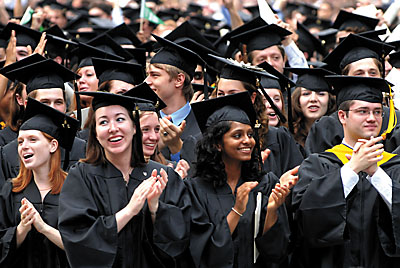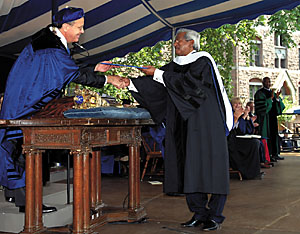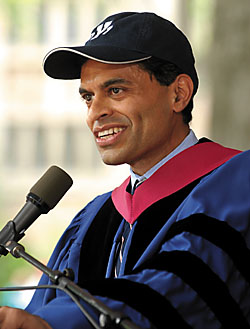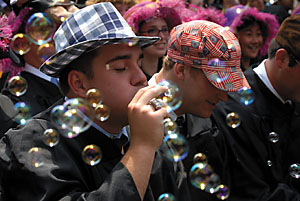 | Students from Yale College, the Graduate School and the University's professional schools applauded each other as President Richard C. Levin conferred their degrees in the Commencement ceremony on May 28. |
As Yale's 1,334 graduating seniors gathered in Woolsey Hall to hear parting words from President Richard C. Levin, they were reminded that they held the distinction of being the first class in the history of Yale College whose members come from as many foreign nations as they do U.S. states: in both cases, 50.
Indeed, just scanning the triumphant faces of the Class of 2007 as its members joined together for final celebratory events -- including Levin's Baccalaureate Address, Senior Class Day exercises and Yale's 306th Commencement ceremony -- made the diversity of the graduating class abundantly clear.
The words of wisdom imparted to the soon-to-be graduates by Levin during his Baccalaureate Address, and later by Class Day speaker and journalist Fareed Zakaria '86, emphasized the importance of the very quality that allowed for such a diverse and international class: the ability to "stay open" to new ideas, new experiences, new cultures and new people.
In his address, Levin compared the start of the seniors' stay at Yale to the trip of another historic group, the "Yale 100," a delegation of 100 Yale students, faculty and staff, including the Yale president, which had just returned on May 25 from a 10-day trip to China.
"Our group [the Yale 100], in its way, resembled your class," Levin told the seniors. "We were a diverse assembly -- two or three from each residential college, two from each professional school, a half dozen from the Graduate School of Arts and Sciences, and about three dozen faculty and staff from all over the University. Very few people knew more than two or three others. Yet, just as you did in your first days at Yale, many discovered new friends with whom they shared a lot, as well as those whose perspectives and interests differed sharply from your own." (See the full text of Levin's Baccalaureate Address.)
The Baccalaureate marked the beginning of three days of ceremonies over Memorial Day weekend honoring the seniors, who together with nearly 1,720 students from Yale's Graduate School and its 11 professional schools, became official Yale alumni during the May 28 Commencement ceremony. Attended by more than 10,000 family members and other guests, the event was held under intermittently sunny skies on the Old Campus, and included the awarding of honorary degrees to 10 distinguished individuals and a blessing from outgoing University Chaplain Frederick J. Streets.
The chaplain said, in part, "This festive occasion by which we usher [the graduates] into the world is not only a symbol of our hope for them, but also for humankind and the earth which sustains us. We pray for the healing of wounds visible and invisible suffered by those so affected by war, diseases, hunger and famine. Help us all wherever our paths lead us to be instruments of peace, good neighbors to others and stewards of our earth."
The students from Yale College, the Graduate School and the professional schools bellowed out exuberant cheers as the deans of their schools "presented" their respective soon-to-be graduates to Levin and requested that he confer their degrees. (Students from the Law School and those students in Yale's Physician Assistant Program participate in the ceremony but do not actually complete their degrees until after Commencement). Student representatives walked up to the Commencement dais to accept the symbolic degrees on behalf of their classmates. In keeping with tradition, students from the various professional schools decorated their black gowns or mortarboards with symbols of the fields they are entering, such as stethoscopes (for medical students) and leafy garlands (for graduates of the School of Forestry & Environmental Studies (F&ES).
This year, the 117 members of the F&ES Class of 2007 demonstrated the knowledge they gained as students and their commitment to fighting global warming by investing in projects that sequester carbon dioxide or develop renewable energy in order to offset the pollution their families emitted to travel to Commencement. Using a travel calculator on the Native Energy website to determine their families' carbon emissions (some came from as far away as China, India and Nepal), the students determined that they must offset a total of 330 tons of carbon dioxide, which is equivalent to the combined weight of 75 full-grown African elephants. The class spent $2,340 ($20 per graduate) to arrange for the carbon dioxide offsets with three organizations -- the Conservation Fund, Native Energy and CarbonFund.org, which are involved in reforestation, renewable energy and energy efficiency projects throughout the United States. In addition, the cocktail party for F&ES on the day before graduation featured locally produced organic wines and cheeses, biodegradable plates and recycled napkins.
The day before Commencement, the soon-to-be Yale College graduates gathered on Old Campus for a Class Day ceremony that featured an address by Zakaria, the awarding of teaching and student prizes, a recitation of the Ivy Ode and other traditions. As is the custom at this event, students entertained their guests and themselves by donning all manner of creative headgear for the occasion, including leprechaun hats, ribbon-strewn bicycle helmets (and even decorated bicycle wheels), birds' nests, slabs of foam cheese, a Chinese pagoda, rubber ducks and pirate caps.
He noted that during the students' time at Yale, the world has "grown economically at a faster pace than at any time in four decades" and that average income worldwide has grown faster in the past five years than at any time in recorded history. He told the graduating seniors that these trends have occurred despite the fact that the 9/11 terrorist attacks have been followed by bombings in Bali, Casablanca, Istanbul, Riyadh, Madrid and London, and in spite of two wars, in Iraq and Afghanistan.
"Markets are supposed to be smart," Zakaria said. "Why are they telling us that this political turmoil doesn't matter? Perhaps it is because the current era of globalization is more powerful, more resilient and more long-lasting than many think. We are living through something practically unique today: simultaneous growth in every part of the world. ... It is a world in which for the first time, everyone feels that they have a chance at being a player."
For the United States to retain its "enviable" position as one of the world's most competitive economies, as well as its excellence in higher education, technology and innovation, Zakaria said, Americans must "nurture what has been our greatest strength: staying open.
"What is distinctive about the United States is not its ingenious government programs," he told the graduating class and its guests. "It is that America keeps itself open, wide open to the world, letting in goods and services, commerce and culture, ideas and inventions, and, perhaps most important, people. This openness has allowed us to develop fast and flexibly as an economy, to manage change and diversity as a society and to push new boundaries of individual freedom and personal autonomy. For 100 years, America has invented the future, and we are even now inventing the first universal nation, made of different races, castes, creeds and religions, with a bewildering array of strange names and backgrounds, like mine. ...
"If you want to ask yourself what is America's core competitive strength," he continued, "we take in more immigrants every year than the rest of the world put together. And that is why the United States is the only industrialized country in the world that will not experience a decline in its workforce in the coming decades. And we assimilate these people into society better than any country in the world. It is their incredible energy and hunger -- from the brilliant engineer to the hardworking busboy -- that enriches us and ennobles us, and makes us sure that the United States will not suffer the fate of other great and rich countries, which is that it will never grow fat and lazy."
Zakaria related his own personal experience as a young boy growing up in India, where, he said, "if you did well in school, you were meant to be an engineer." While he began his career at Yale loading up on science courses, Zakaria said, he finally realized that he was most interested in learning and talking about current events. After finishing his Ph.D. at Harvard University, a friend suggested he try a career in journalism, which Zakaria had not considered before. He took his friend's advice, and began work as managing editor of the journal Foreign Affairs. He then moved to Newsweek, and a career in television soon followed.
In addition to overseeing all of Newsweek's editions abroad, Zakaria writes a regular column for the magazine and appears on television as a member of the roundtable of ABC News' "This Week with George Stephanopoulos." He is the author of the New York Times bestseller "The Future of Freedom" and of "From Wealth to Power: The Unusual Origins of America's World Role." He has also written for The New York Times, The Wall Street Journal, The New Yorker, The New Republic and the webzine Zinc. He has won many awards for his writing, particularly for his October 2001 Newsweek cover story "Why They Hate Us."
"If I have any lesson from my career, it is to stay open to that kind of exploration and discovery," Zakaria commented. "And I don't mean that just in a professional sense. I mean that personally, too. Don't block off the unfamiliar. Stay open to new people, new ideas, new experiences, new possibilities, new cultures, new ways of doing things, and you will grow, in your mind and in your heart. These new things may come from anywhere: from a professor, a poem, a child, a colleague, a New York cab driver. Yeah, even that guy, who had the energy and ambition to travel 6,000 miles and is working 16-hour days and knows two languages -- well, three if you count English -- he has something to teach you. You can learn from anyone.
"It is easier to stick with the road well traveled and to close yourself off to something that is strange or unsettling," continued Zakaria. "It may even be the right path for you. But stay open to the possibilities out there. For countries and for people: stay open, and you will grow stronger and more resilient."
Awards and an ode
Six faculty members were honored during the Class Day ceremony for their outstanding undergraduate teaching and 14 graduating seniors were presented awards for their outstanding accomplishments in academics, athletics and service to the public, as well as for their personal qualities.
Irving Ye, secretary of the Class of 2007, welcomed his classmates to the event, saying that the relationships he formed at Yale have been some of the most important of his life. He asked fellow seniors to look at the people sitting to their right and left, then commented, "No matter what type of relationship you have with them, you will be able to recognize them one, five and 20 years from now and be able to say 'hi.' You share a bond with them as members of this class."
Following yet another Class Day tradition -- the reciting of a student-written ode to Yale in English and then translated in a foreign language -- David Griswold read his ode, "Between the Chances," which was translated into Mandarin Chinese by Li Cai and Yili Dong. Griswold's words may best reflect the swirl of emotions that the soon-to-be graduates experienced at the closing of the ceremony as they blew bubbles into the air, savoring their final experiences together as Yale students, aware that their parting is both joyful and full of nostalgic memories. An excerpt of "Between the Chances" follows:
The hidden walkways known to us
The stories of our hands explain
-- By Susan Gonzalez
T H I S
With pomp, Yale celebrates its newest graduates

President Richard C. Levin awards an honorary degrees to BRAC founder Fazle Hasan Abed.
A blessing, degrees and dedication to a cause
Staying open

Journalist Fareed Zakaria offered some wisdom in his Class Day address.
Zakaria -- editor of Newsweek International, ABC News analyst, host of the PBS show "Foreign Exchange" and a Yale trustee -- told the students that even though they are graduating in an era referred to as "The Age of Terror," he is hopeful about their future and that of the world.

Celebrating their final moments
at Yale on Class Day were these bubble-blowing seniors.
Following a tradition that is more than 150 years old, Class Day co-chairs Allison Spitzer and Nathaniel Loewentheil planted the Class of 2007 ivy by Phelps Gate, where the numbers of the class have also been engraved on a stone. In a break from tradition this year, the comedic class "history" -- normally told via a skit on the stage -- was crafted as a video production, and shown to the soon-to-be-graduates and their guests on the large monitors on the sides of the Commencement stage. The video, a spoof on recruitment films for prospective students titled "Yale College Welcomes You," inspired peals of laughter from the seniors and many of their guests.
Now open to those curious
Enough to look.
They pass along a legacy,
Our prints of anonymity
In every nook.
A common bond that must remain,
Though we are gone --
We are the grass, we are the rooms,
The silent marching that resumes
Its slow, proud song.
 W E E K ' S
W E E K ' S S T O R I E S
S T O R I E S![]()
 Yale to increase medical and scientific research programs
Yale to increase medical and scientific research programs
 with acquisition of the Bayer HealthCare complex
with acquisition of the Bayer HealthCare complex![]()
 Acquisition to expand Yale's economic impact
Acquisition to expand Yale's economic impact![]()
 Milestones in building Yale's medical and scientific research strength
Milestones in building Yale's medical and scientific research strength![]()
![]()
 Study shows stem cells curb Parkinson's disease in primates
Study shows stem cells curb Parkinson's disease in primates![]()
![]()
 China proves 'a great joy' for Yale 'friends from afar'
China proves 'a great joy' for Yale 'friends from afar'![]()
![]()
 COMMENCEMENT 2007
COMMENCEMENT 2007
 With pomp, Yale celebrates its newest graduates
With pomp, Yale celebrates its newest graduates![]()
 Baccalaureate Address
Baccalaureate Address![]()
 Honorary Degrees
Honorary Degrees![]()
 Outstanding teachers and students are awarded prizes
Outstanding teachers and students are awarded prizes![]()
![]()
 Former Yale gallery director has been elected an alumni fellow
Former Yale gallery director has been elected an alumni fellow![]()
![]()
 NASA administrator is appointed University's first CFO
NASA administrator is appointed University's first CFO![]()
![]()
 'Lights, cameras and action!' come to campus
'Lights, cameras and action!' come to campus![]()
![]()
 Delegations travel to Brazil and Mexico for alumni-hosted events
Delegations travel to Brazil and Mexico for alumni-hosted events![]()
![]()
 Initiative seeks to promote effective use of solar power
Initiative seeks to promote effective use of solar power![]()
![]()
 Air pollution is shown to harm pregnant woman
Air pollution is shown to harm pregnant woman![]()
![]()
 SCHOOL OF MEDICINE NEWS
SCHOOL OF MEDICINE NEWS
 Sleep apnea is linked to heart disease and diabetes
Sleep apnea is linked to heart disease and diabetes![]()
 Research findings on FMRP protein may lead to . . .
Research findings on FMRP protein may lead to . . .![]()
 Residents' work-hour reductions not harmful to patients, study says
Residents' work-hour reductions not harmful to patients, study says![]()
 New radio show offers information, support to cancer patients
New radio show offers information, support to cancer patients![]()
 Scientific symposium will honor renowned faculty member
Scientific symposium will honor renowned faculty member![]()
![]()
 Students' research on wood frogs is featured in Peabody exhibit
Students' research on wood frogs is featured in Peabody exhibit![]()
![]()
 In Memoriam: Naturalist Charles L. Remington
In Memoriam: Naturalist Charles L. Remington![]()
![]()
 Performances will showcase talents of young playwrights
Performances will showcase talents of young playwrights![]()
![]()
 New Yale website illustrates the history of slavery in Connecticut
New Yale website illustrates the history of slavery in Connecticut![]()
![]()
 Campus Notes
Campus Notes![]()
Bulletin Home |
| Visiting on Campus
Visiting on Campus |
| Calendar of Events
Calendar of Events |
| In the News
In the News![]()
Bulletin Board |
| Classified Ads
Classified Ads |
| Search Archives
Search Archives |
| Deadlines
Deadlines![]()
Bulletin Staff |
| Public Affairs
Public Affairs |
| News Releases
News Releases |
| E-Mail Us
E-Mail Us |
| Yale Home
Yale Home